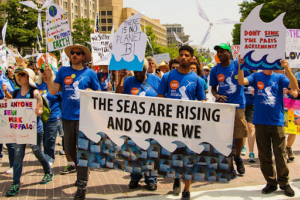
Most educated adults are aware of the rapidly declining state of the environment, but many, if not the majority of us, find it easy to ignore the urgency of it. I, myself, did not confront exactly what is going on and what I can do about it until I started studying it in college.
I did not go into college planning on studying the environment, I didn’t even know there was a major for that, but now as a rising junior, I have found myself as an environmental studies minor at Georgetown University. I had picked a random class to fulfill my “science for all” credit that I need to graduate, and it ended up inspiring my minor. Becoming environmentally conscious can be easier than you think, and it is becoming less and less of a choice. The world is suffering at the hands of global warming, pollution, and loss of biodiversity, among a variety of other devastating issues, but change, believe it or not, can begin with you!
The first step you can take to make a difference is educating yourself. There are plenty of resources both online and off that make this very accessible and interesting. A great online tool to bring your awareness to the impact we each individually have on the environment is carbon footprint calculators that take information about your lifestyle and living habits. They tell you in what ways that is contributing negatively to the environment. Being aware of this may be intimidating, but is also important so you can figure out how to change some of these harmful habits. Websites like footprintcalculator.org tell you specific ways you can reduce your footprint based on your results.
Another way to educate yourself is by taking a trip to your local library (or an online alternative). There are great books that turn this invaluable information into an interesting read. Some suggestions that I have found to be helpful and fascinating reads are The Brilliant Abyss by Helen Scales, The Sixth Extinction by Elizabeth Kolbert, A Life on Our Planet by David Attenborough, and The Serengeti Rules by Sean B. Carroll.
Beyond educating yourself, you can also take action in your home by switching to a variety of reusable products. These products are usually fantastic swaps, with many of them being far more cost effective and better quality, all while being better for the environment. A lot of these switches are much easier to make than you might think: you can start just by using reusable water bottles, straws, and shopping bags. You can go even further by investing in wool dryer balls – a one-time purchase alternative to dryer sheets – eco-friendly tampon alternatives like the DivaCup, or making the switch to zero-waste shampoo and conditioner products that avoid plastic packaging.
So many products in our home have sustainable alternatives, and all of these changes can go a long way for our planet. From educating yourself and others to taking action in your own home, these simple tasks can make you an eco-warrior – something our planet and our future generations will thank you for.
